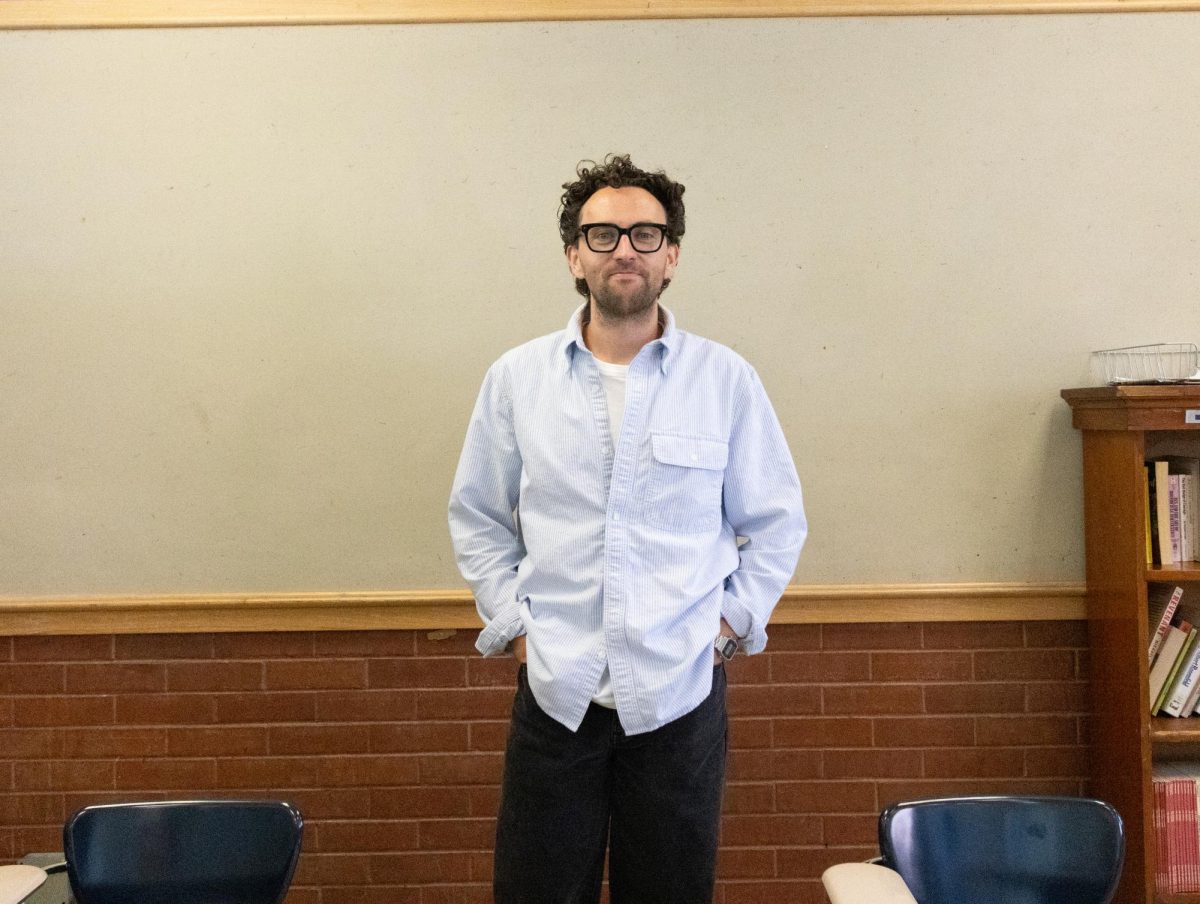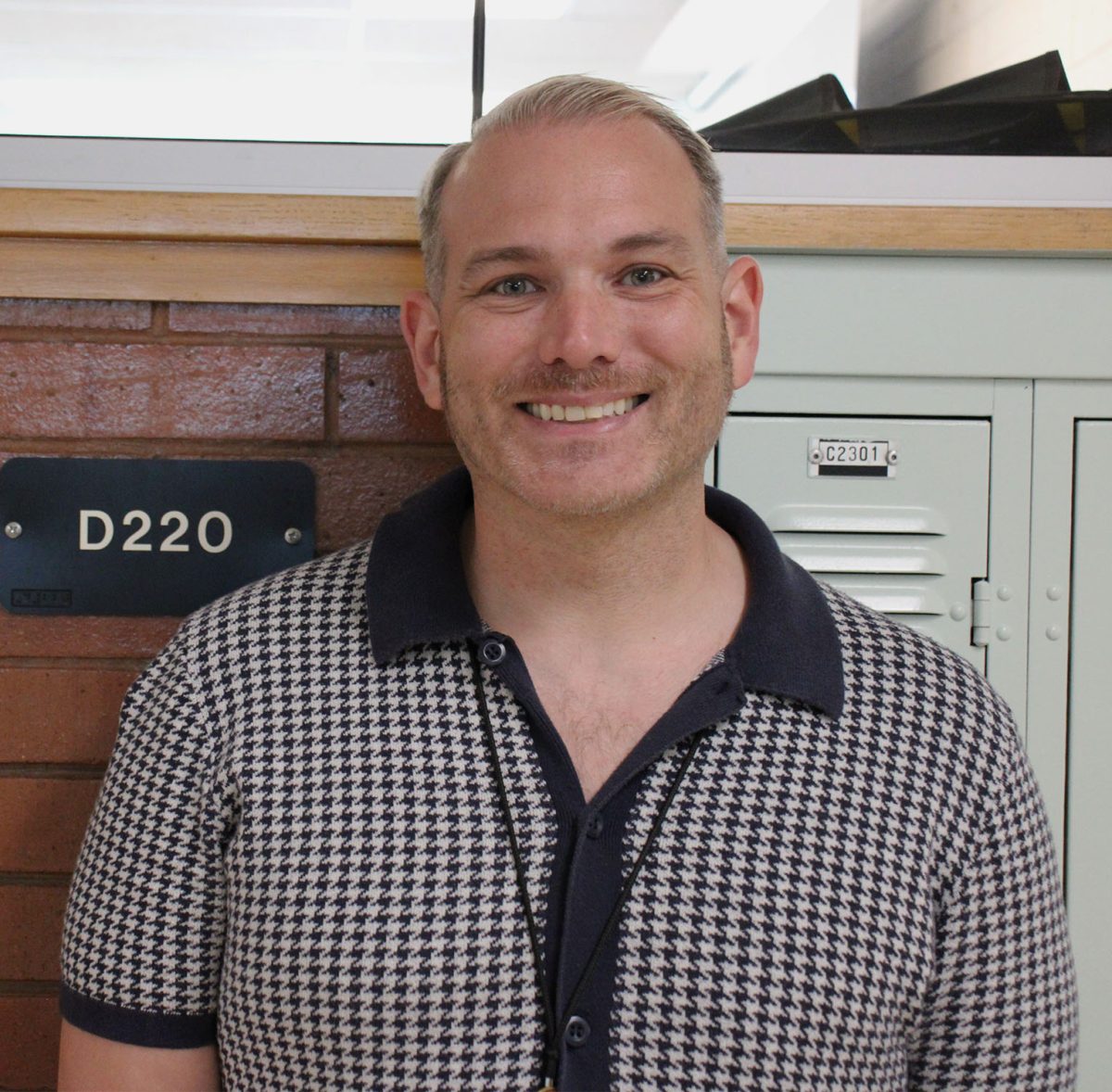Highland Theatre’s Latest Production Carried Powerful Themes, Emotional Performances
Sebastien Green wears a costume splattered with fake blood during his performance of Creon in Antigone.
April 27, 2023
Speechless.
In relation to the theater, such a word conjures up the image of a performance so wonderful and evocative that the audience finds itself stripped of anything to say for some time afterward. No words could accurately describe the pure awe in which they are left.
Speechless can also be used to describe the story itself brought to life on the stage. Some stories are so heart wrenching and intense that there is nothing the audience can do afterward except let it all sink in. The emotions and messages are felt so deeply that you must let yourself comprehend it all before you can even begin to put what you have seen into words.
Highland’s production of Antigone left me speechless in all variations of the word.
This tragic story of love, loss, and regret paired with the intense portrayals of each characters’ emotions were enough to leave the words stuck in my throat, and not just because of the tears.
From the very beginning, the audience was in for a wonderful performance. With no hesitation, the production opened with a ruthless battle in which two brothers were killed by each other’s hand. A heartrending scream from the lips of their sister and the powerful silence of their uncle signaled it was going to be a performance far different from anything Highland Theatre had put together this year.
As the title suggests, the Greek tragedy, written by Sophocles, follows the story of the young woman Antigone (Leah Schwemmer), daughter of Oedipus and sister to brothers Polynices and Eteocles, on her quest to give Polynices a proper burial and send his soul off to the afterlife, despite the fact he died a traitor to the city of Thebes.
In Ancient Greece, a proper burial was an important ritual in sending the dead to the afterlife. Any soul whose body was left unburied would be subject to eternal damnation.
In burying her traitorous brother, Antigone undermines the law set in place by Creon (Sebastien Green), her uncle and the new king of Thebes, which sentenced anyone who attempted to bury the body to death.
But honoring her family, regardless of whether they were traitors or not, overshadows Antigone’s fear of death or the desire to obey the laws of the king. Instead, she trusts herself to the judgment of the gods and is ready to embrace her fate, even after she gets caught. Creon begs her to see her mistakes and admit that she acted childishly. Antigone refuses to comply, preaching to the people of Thebes by asking, “Must an enemy dead remain forever an enemy?” She begs for anyone to stand alongside her in the belief that she has done nothing wrong and that there is nothing in her actions that justifies death.
When no one chooses to stand up for her, Antigone decides, in a heartbreaking speech, that she would rather die and be with her family than live in a world where she cannot honor those who share her blood. If she cannot honor her dead brother, then there is nothing left for her to live for.
And so, defeated and disgraced, Antigone is escorted to a cave that will soon become her rocky tomb.
Creon, distressed by the exile of his niece and the suicidal threats from his own son, who was betrothed to Antigone, is left to grapple with his decisions and his refusal to listen to anyone’s advice. It is not until his priest, Tieresias (Zoe Mosdell), brings word that Creon has brought nothing but pain to Thebes that he admits his mistakes.
But admitting one’s wrongdoings is not always enough to reverse them, and Creon soon realizes that his actions sowed the seeds for Antigone’s death which in turn brought Haimon (Rowan Jackson), her betrothed, to fall upon his own sword. At the sight of all this misery, Eurydice (Sadie Schroeder), Creon’s wife, takes her own life as well. Creon’s repentance alone cannot repair what his mistakes have caused.
Finding himself utterly alone, Creon must gather the strength to move forward, shouldering the misery his own actions have created.
And thus, the curtain falls.
The play may carry Antigone’s namesake, but it is just as much Creon’s story as it is hers. He is the one who survives the tragedy, though by no means unscathed, and it is he who learns one of the most valuable lessons the story provides–finding the strength to admit you were wrong and learning to live with the consequences of your mistakes.
Highland junior Sebastien Green was able to portray Creon’s angers, frustrations, and inner turmoil in such a raw way that the audience was able to connect with his growth throughout the story and his realization of what he has done, despite Creon not being the most likable character in Antigone. Green’s performance brought out the humanity in a character that many might first pass over for a heartless and remorseless ruler, not deserving of any sympathy.
Green did not stand alone in emotional performances. Each cast member had their opportunity to bring out the deepest-buried demons of their characters into the spotlight each in their own way. Each one of them instilled their share of sorrow into the audience. The chorus perfectly portrayed the people’s initial loyalty to Creon and later their growing distrust of him through quiet acts of solidarity as even they can no longer deny the mistakes of their ruler.
The set, while not the most extravagant, served only to enhance the story with its simplicity, allowing for more focus on the characters and the story itself. The script’s modern translation allowed for better understanding from the audience perspective while still retaining the feel of a story that has been around for thousands of years.
The story also contains just as many years of wisdom.
Antigone’s themes and lessons span the gap between its creation and the modern world, and through the life brought to it from Highland’s theater department, reminds us that lessons learned thousands of years ago are still relevant in today’s world and will not cease to be relevant to future generations. Antigone’s lessons will never stop being important, and never have they been so vital in a world where many have difficulty admitting their wrongdoings and owning up to their mistakes.
Antigone was both a wonderful performance and a critical lesson to all who bared witness to it.
“Of happiness, the greatest part is wisdom. Not just to know, but to understand. Not just to hear, but to listen.”





























